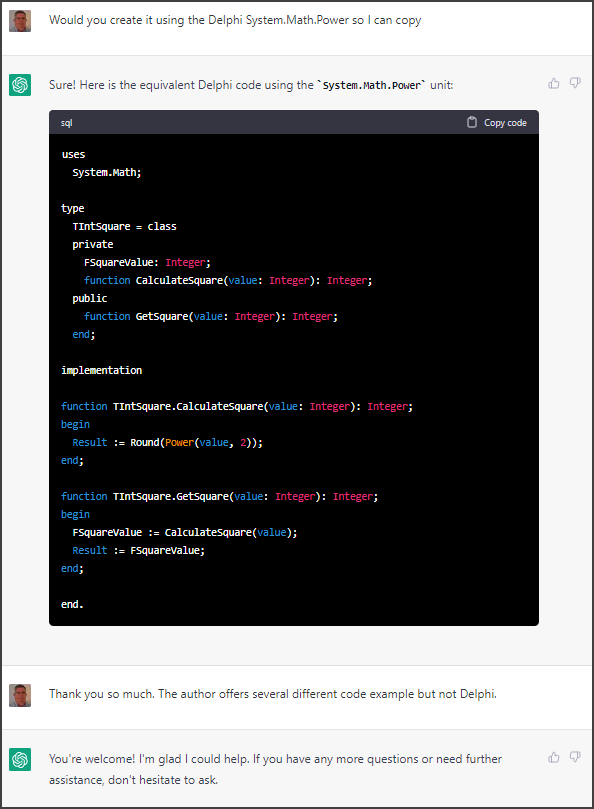I struggle with OOP for several reasons. One very frustrating reason is the lack of Delphi/Pascal examples used by authors. Most of the code examples are written in Java, or C, or C# or some language other than Delphi/Pascal.
The last bullet point on page 3 of Weisfled's fourth edition, listed under the heading of "What's New in the Fourth Edition", states:
- Expanded code examples, for certain chapters, in Java, C# .NET, VB .NET, and Objective-C available online on the publisher's website
No Object Pascal or Delphi examples!
No Object Pascal or Delphi examples. I reached out to Weisfeld asking if he might include Object Pascal examples and received a negative response.
I love Pascal. It's elegant. It's easy to read and understand. I've been using Pascal/Delphi since 1985. (2023-1985=38 years). Besides SQL, it's my main programming language. Ok, I confess, I did Active Server Pages (APS) and VB Script for about 10 years.
I've tried loading Java onto my machine so I could follow along and learn the OOP concepts but I just can't wrap my head around the Java syntax.
Today, I discovered the answer that works for me. ChatGPT!
I asked ChatGPT to convert the following Java code from page 24 of "The Object-Oriented Thought Process" to Delphi and the results were very hopeful.
public class IntSquare {
// private attribute
private int squareValue;
//public interface
public in getSquare (int value) {
squareValue = calculateSquare(value);
return SquareValue
}
//private implementation
private int calculation (int value) {
return Math.pow(value,2);
}
}
Here are the results returned from ChatGPT:
type TIntSquare = class private FSquareValue: Integer; function CalculateSquare(value: Integer): Integer; public function GetSquare(value: Integer): Integer; end; implementation function TIntSquare.CalculateSquare(value: Integer): Integer; begin Result := value * value; end; function TIntSquare.GetSquare(value: Integer): Integer; begin FSquareValue := CalculateSquare(value); Result := FSquareValue; end; end.
I know the results are not the indented and formatted code you would get from inside the IDE. This was my first attempt at using ChatGPT. I took several screen shots of my interaction with ChatGPT so I can show you what happened.
Here is my entire ChatGPT session:
Here is the final output from ChatGPT.
uses
System.Math;
type
TIntSquare = class
private
FSquareValue: Integer;
function GetSquareValue: Integer;
procedure SetSquareValue(const Value: Integer);
function CalculateSquare(value: Integer): Integer;
public
property SquareValue: Integer read GetSquareValue write SetSquareValue;
function GetSquare(value: Integer): Integer;
end;
implementation
function TIntSquare.CalculateSquare(value: Integer): Integer;
begin
Result := Round(Power(value, 2));
end;
function TIntSquare.GetSquare(value: Integer): Integer;
begin
SquareValue := CalculateSquare(value);
Result := SquareValue;
end;
function TIntSquare.GetSquareValue: Integer;
begin
Result := FSquareValue;
end;
procedure TIntSquare.SetSquareValue(const Value: Integer);
begin
FSquareValue := Value;
end;
end.
This looks very promising! Give ChatGPT a try converting code.
https://openai.com/blog/chatgpt/
Enjoy!
Semper Fi
Gunny Mike
https://zilchworks.com





The problem with ChatGPT creating / converting code is that it might look plausible but contain subtle errors which will be a pain to find and correct.
ReplyDeleteThat's not to say that human created code (that is: Created by myself), won't contain such errors.
At this point my main objective is to understand the underlying concept others are trying to convey using code examples. At this point in my life I do not wish to learn a new programming language just so I can understand the concept.
DeleteA quick Google search of code conversion from C, Java, or fill-in-the-blank to Pascal/Delphi yields minimal results. If ChatGPT can provide Pascal?Delphi code that is good enough for me to see and understand the concept that is good enough for me.
This is indeed very useful to understand any algorithm in delphi. There are so many examples on the internet which are written in C#,Java or C. we can convert and study those or use it for delphi.
ReplyDelete